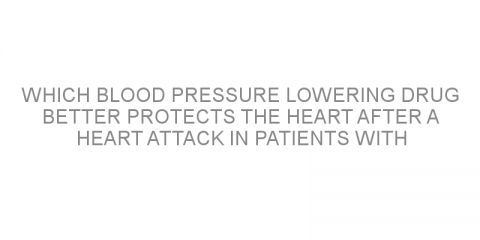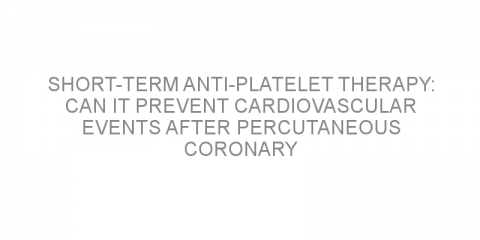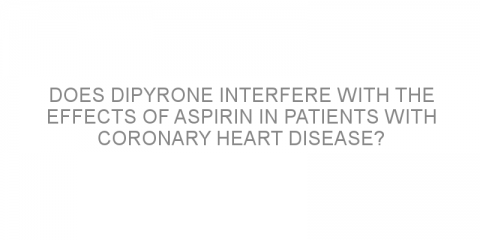In a nutshell This trial aims to test new smart technology for preventing patients who have recently had a heart attack from being readmitted to the hospital. The main outcome to be measured will be time to hospital re-admission within 30 days of discharge. This study is being conducted in Maryland, Massachusetts, and Pennsylvania, in the United...
Read MoreCoronary artery disease Posts on Medivizor
Which blood pressure lowering drug better protects the heart after a heart attack in patients with diabetes?
In a nutshell The aim of this study was to compare the effectiveness of angiotensin-converting enzyme inhibitors (ACEI) and angiotensin II receptor blockers (ARBs) in protecting the heart in patients with diabetes that have had a heart attack and who had stents placed. The main finding of the study was that ACEI reduced the risk of major adverse...
Read MoreShort-term anti-platelet therapy: can it prevent cardiovascular events after percutaneous coronary intervention (PCI)?
In a nutshell This study investigated if short-term dual antiplatelet therapy (DAPT) improves outcomes after percutaneous coronary intervention (PCI). They found that short-term DAPT did not increase the risk of heart attacks or clots after PCI. Some background Patients with coronary artery disease (CAD) may have blockages in the arteries supplying...
Read MoreDoes heart rate predict the success of percutaneous coronary intervention?
In a nutshell This study investigated if heart rate can predict the success following a percutaneous coronary intervention (PCI). They found that a higher heart rate (HR) before PCI was linked to a short-term risk of major adverse cardiac events (MACE; stroke, heart attack or death due to heart disease). Some background Coronary artery disease...
Read MoreCombining clopidogrel and aspirin in coronary artery disease
In a nutshell This study investigated if clopidogrel (Plavix) and aspirin are effective when taken together for treating coronary artery disease (CAD). They found that clopidogrel and aspirin improved CAD symptoms compared to aspirin alone. Some background Coronary artery disease (CAD) is caused by reduced blood flow to the heart. This leads...
Read MoreBisoprolol – is it an effective long-term treatment for angina?
In a nutshell This study investigated if bisoprolol (Zebeta) is safe and effective for long-term angina treatment. They found that bisoprolol was effective and well-tolerated long-term. Some background Angina is chest pain caused by reduced oxygen supply to the heart. Reduced blood flow to the heart can be caused by blockages in vessels...
Read MorePerindopril and amlodipine – can this combination prevent organ damage in ischemic heart disease?
In a nutshell This study investigated the effects of the drug combination perindopril and amlodipine (PEAM) on organ damage in patients with hypertension and ischemic heart disease (IHD). They found that PEAM was effective in reducing blood pressure and organ damage in these patients. Some background Hypertension or high blood pressure (BP) is a...
Read MoreDoes depression increase death risk in patients with coronary heart disease?
In a nutshell This study investigated if there is a link between depressive symptoms and sudden death in patients with coronary heart disease (CHD). They found that patients with depressive symptoms have a higher risk of sudden cardiac death. Some background Coronary heart disease (CHD) is caused by reduced blood flow to the heart. There are a...
Read MoreDoes dipyrone interfere with the effects of aspirin in patients with coronary heart disease?
In a nutshell This study investigated if dipyrone interacts with aspirin in patients with coronary heart disease (CHD). They found that dipyrone interferes with aspirin and should be used with caution in patients with CHD. Some background Coronary heart disease (CHD) is caused by reduced blood flow to the heart. This can be caused by a number of...
Read MoreStents vs. bypass – a 10 year follow-up in patients with coronary heart disease
In a nutshell This study investigated the long-term outcomes of coronary artery bypass grafting (CABG) and percutaneous coronary intervention (PCI) to treat coronary heart disease (CHD). They found that CABG was associated with a longer-term benefit than PCI. Some background Coronary heart disease (CHD) is caused by blockages to the vessels...
Read MoreRanolazine treatment to improve outcomes for patients with angina
In a nutshell This study investigated if ranolazine (Ranexa) improved angina symptoms and blood flow. They found that ranolazine improved angina symptoms and blood flow in patients with reduced coronary (blood vessels that supply the heart) flow. Some background Angina is the term for chest pain. Chest pain usually arises when the flow of...
Read MoreSurgical or medical intervention: which approach is more effective for patients with silent myocardial ischemia?
In a nutshell This study investigated if revascularization (RV) is more effective than medical treatment (MT) in patients with silent myocardial ischemia (SMI). They found that RV was more effective than MT at reducing the risk of death in these patients. Some background Coronary heart disease (CHD) is a major cause of death worldwide. Myocardial...
Read More












